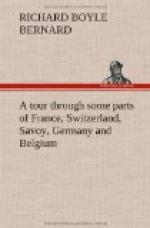The pavement on which we travelled was rendered very necessary by the weight of the carriages, which would soon make the road impassable. The country resembled the rest of Flanders. I observed a greater number of sportsmen than I had yet seen, well provided with dogs, ranging a country which is too thickly inhabited to abound in game; and I have seldom seen a district where there are fewer birds of any kind. Courtray is a large and handsome town. Here I observed some large dogs employed in drawing small carts, a custom very general in Holland. The town-house bears an inscription, indicating that it was erected by the senate and people of Courtray; a style lately used by all the cities of Germany which depended on the empire, however inconsiderable they had become in the course of years. There are many beggars here although the town and neighbourhood exhibits more industry than I had observed since I left Antwerp.
At Courtray and Menin the garrisons are English, and a little beyond the last named place we entered France. The boundary stone was pointed out to me as curious, from having escaped unnoticed during the revolutionary times, as it bears the royal arms of France on one side and those of Austria on the other, and after a series of eventful years, it serves again to point out the ancient and legitimate limits of France. We were detained above an hour at the custom-house, as the diligence was heavily laden and all merchandise, as well as the baggage of the passengers, was examined with minute attention.
The tax was however only on the patience, the purse not being diminished by any claim from the officers, who were extremely civil in assisting to arrange what their search had convinced them not to be illegal. Our passports were not demanded until we reached the out-posts of Lille, and we were not long detained, as every thing was satisfactory. I was told that a few days before, two English travellers not being provided with sufficient passports, were taken out of the diligence and conveyed under an escort into Lille, where they were next day recommended to return to England, and provide themselves with proper passports.
Lille is the capital of French Flanders, and the chief place in the department du Nord; it is one of the handsomest and best built cities of France, as well as the strongest fortified. The citadel especially, is considered as the chef d’oeuvre of the celebrated Vauban, this place having been one of the most important fortresses on this side of France; it has again become so, although far removed from that line which an insatiable ambition would have established as the boundary of France; and which included nations not desirous of the union. The population of Lille is estimated at 61,500. It contains many manufactories, which a period of tranquillity will probably restore to their ancient prosperity. Many of the streets here reminded me of Paris.




